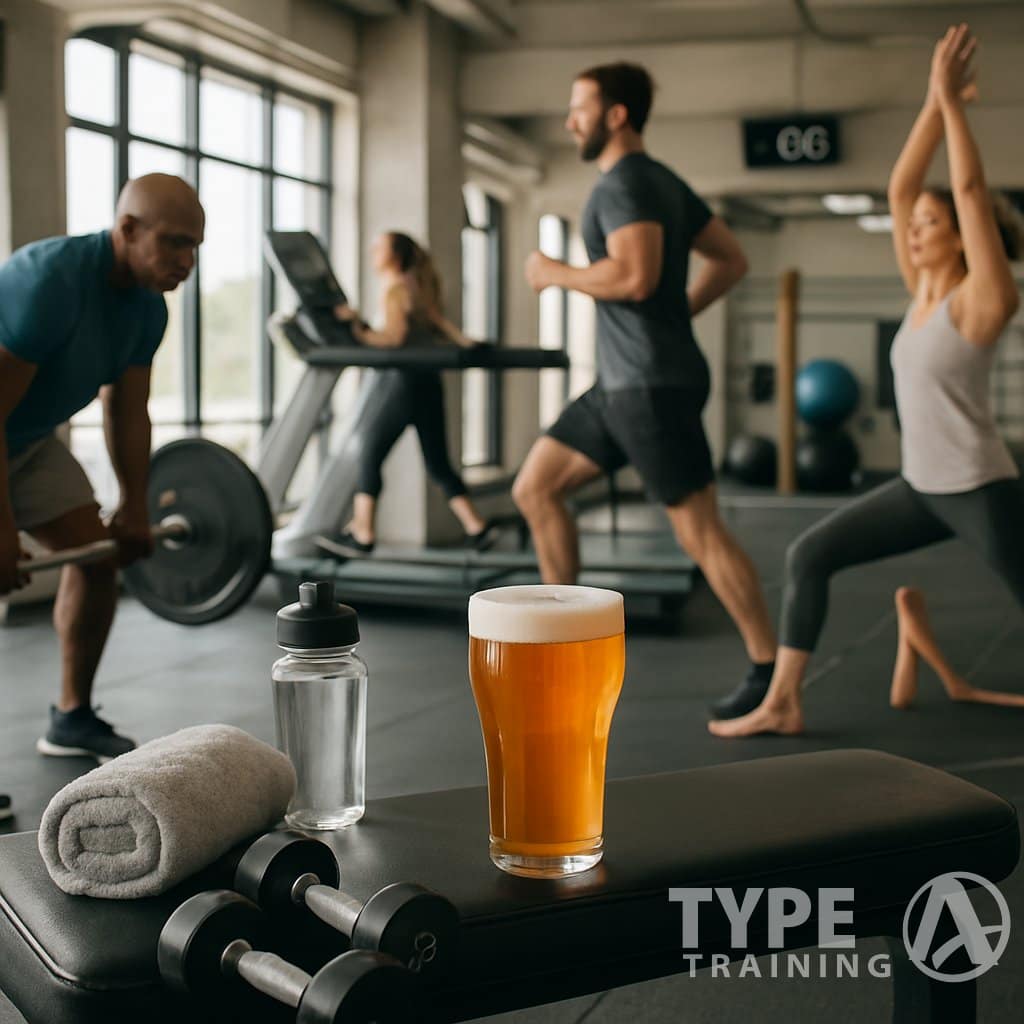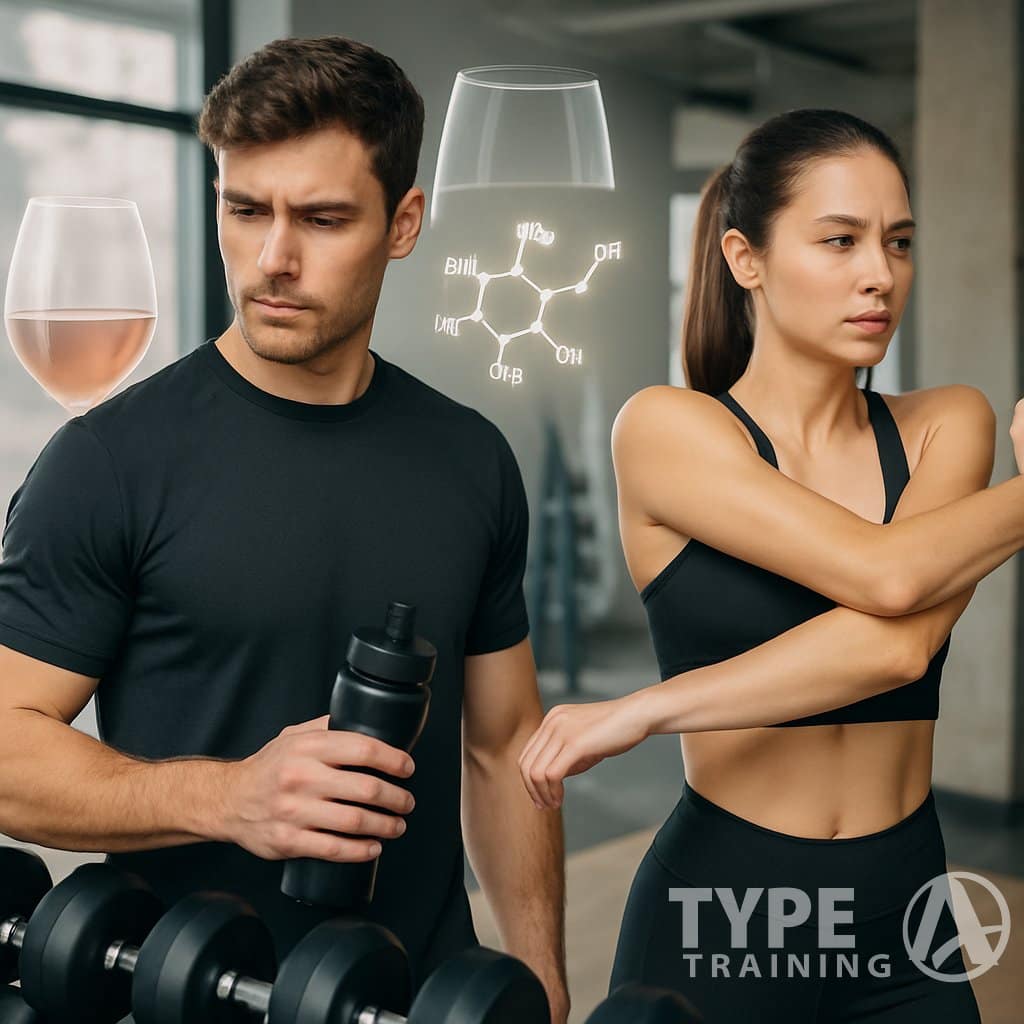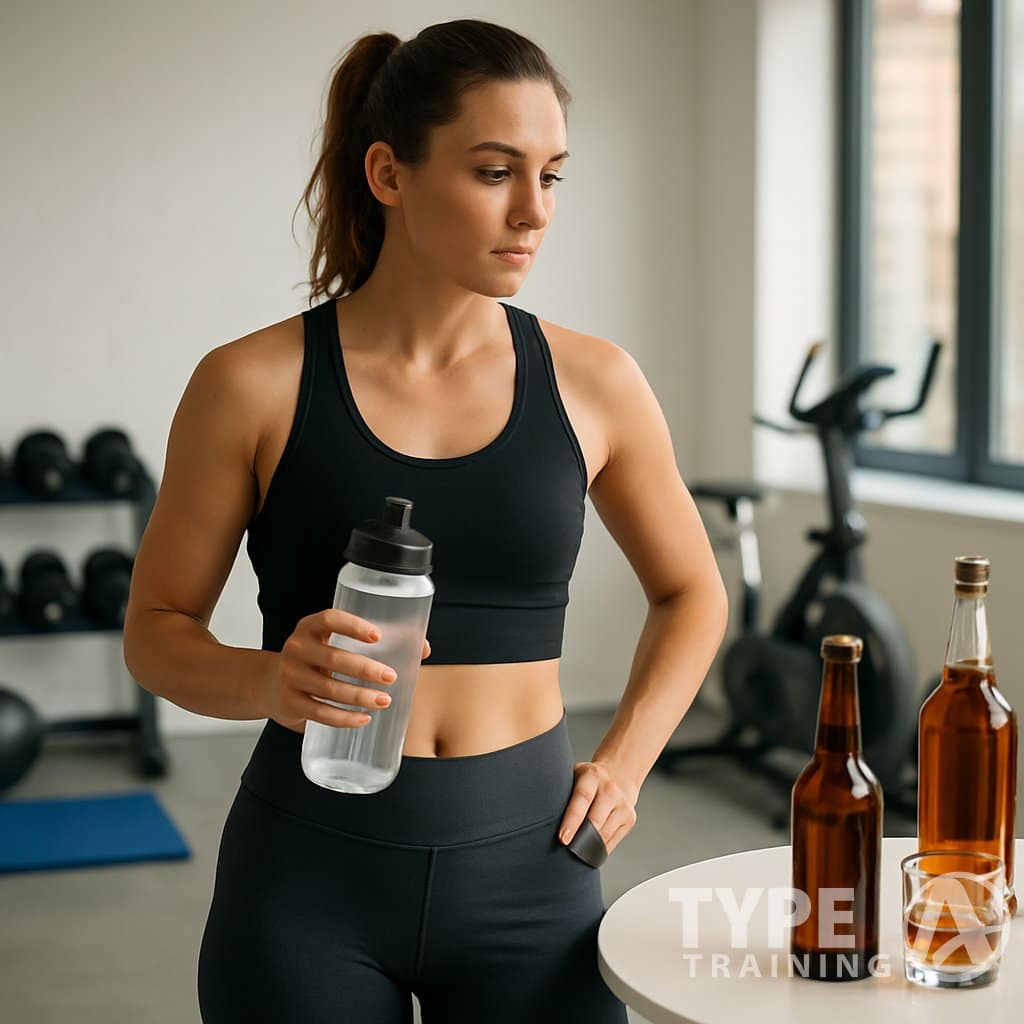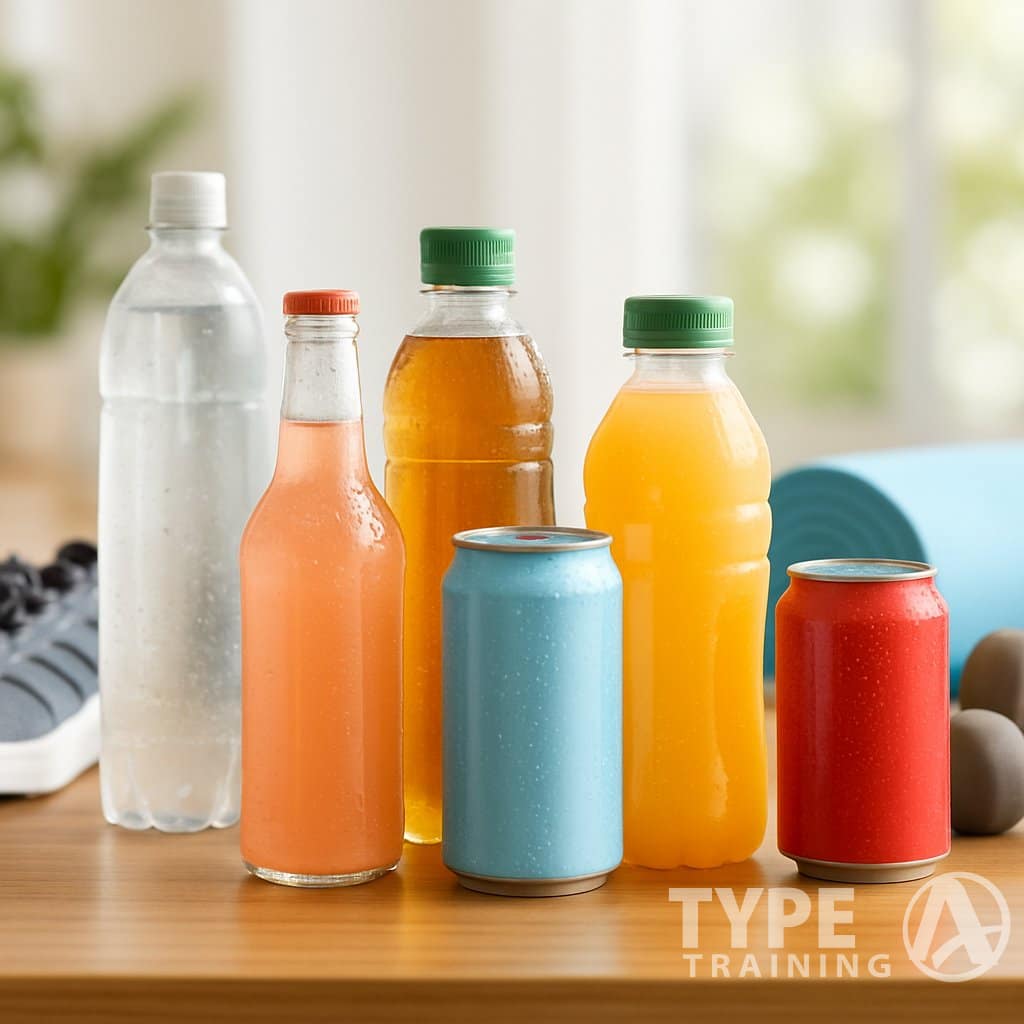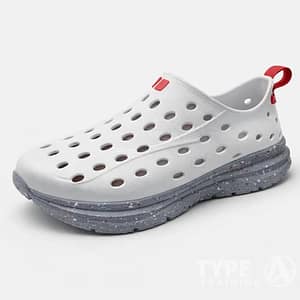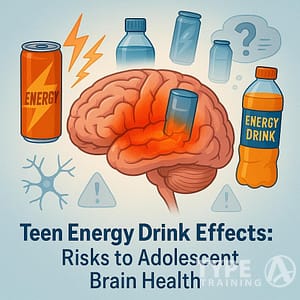TL;DR: Alcohol significantly impairs fitness performance by disrupting muscle recovery, reducing protein synthesis by up to 20%, and slowing metabolism by up to 73%. It dehydrates your body, ruins sleep quality, lowers testosterone levels by 23%, and can extend recovery time from 24-48 hours to 72+ hours. Even moderate drinking interferes with workout results, making strategic timing and moderation essential for anyone serious about their fitness goals.
Enjoying a drink with friends can feel like a well-deserved reward after a tough workout. But if you’re serious about your fitness goals, you might want to think twice about that post-gym beer.
Alcohol can impact your fitness performance by affecting everything from muscle recovery to hydration and even your metabolism.
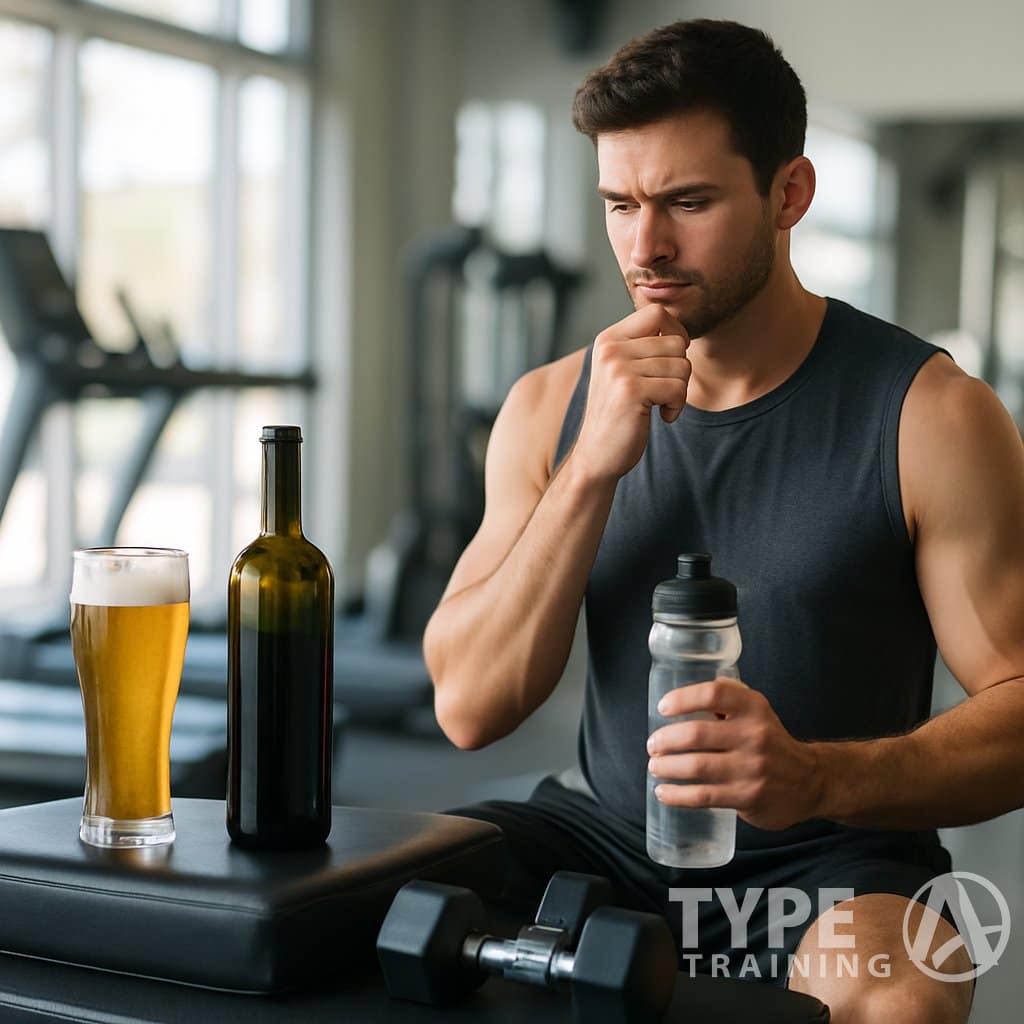
Popular posts:
Many fitness enthusiasts don’t realize alcohol can interfere with their progress in several important ways. Even moderate alcohol intake can reduce muscle protein synthesis, the process your body uses to repair and build muscle after exercise.
It also affects your body differently depending on your individual metabolism and fitness level. That’s a detail a lot of people overlook when they’re out celebrating.
Finding balance between your social life and fitness routine doesn’t always mean giving up alcohol. If you understand how alcohol impacts your workout routine, you can make smarter choices about when to drink and when to hold off, especially if you’ve got specific goals in mind.
Key Takeaways
- Alcohol reduces muscle protein synthesis by up to 20% and can disrupt the muscle-building process for 24 hours after just one heavy drinking session.
- Even moderate drinking decreases exercise performance by 4-8% and can extend normal recovery time from 24-48 hours to 72+ hours.
- Alcohol acts as a diuretic, causing you to lose 120ml of water per drink and depleting essential electrolytes needed for muscle function.
- Your body prioritizes metabolizing alcohol over burning fat, slowing your metabolic rate by up to 73% for several hours after drinking.
- Alcohol disrupts sleep quality by reducing deep, restorative sleep and can lower testosterone levels by 23% while increasing cortisol.
- Women experience more pronounced effects from alcohol due to less body water, fewer alcohol-metabolizing enzymes, and hormonal disruptions.
- Strategic moderation—limiting intake to 1-2 drinks occasionally and avoiding alcohol 48 hours before important workouts—can help balance social life with fitness goals.
Alcohol’s Immediate Effects on Exercise Performance
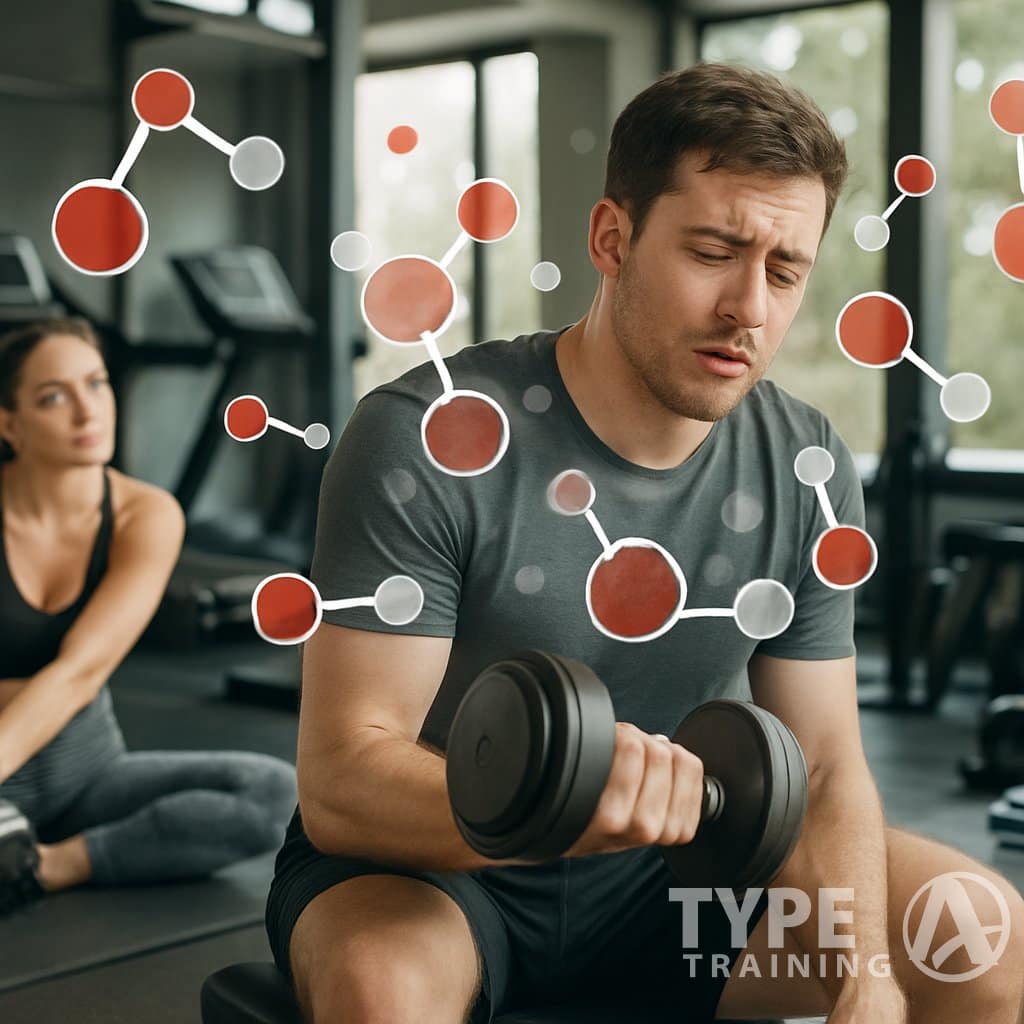
Drinking alcohol shortly before or during exercise negatively impacts several aspects of physical performance. These effects can compromise your workout quality and put you at greater risk for injury.
Reduced Strength and Endurance
Alcohol before exercise can decrease your endurance performance, even in small doses. It interferes with how your body produces energy during workouts.
When you drink before exercising, your body focuses on metabolizing the alcohol first. That means it pulls resources away from muscle performance and recovery.
You’ll likely fatigue faster during cardio or strength training. Research shows alcohol affects your body’s ability to:
- Maintain proper hydration levels
- Transport oxygen efficiently
- Process lactic acid buildup
- Restore glycogen (energy) stores
Even moderate drinking can reduce your maximum power output by 4-8% in the following 24 hours. That’s a bigger hit than most people expect.
Decreased Coordination and Reaction Time
Alcohol significantly impacts your coordination and reaction time during exercise. Even small amounts can have lasting effects, sometimes longer than you’d think.
Your balance takes a hit when alcohol is in your system, making falls or bad form more likely. This is especially risky during activities that need precision, like weightlifting or gymnastics.
Reaction times slow down noticeably with alcohol. Studies show impairments of:
- Fine motor control
- Hand-eye coordination
- Balance and spatial awareness
- Movement precision
These effects can linger for up to 72 hours after drinking. So, that Saturday night out might still mess with your Monday workout performance.
Impaired Decision-Making During Workouts
Alcohol before exercise can mess with your judgment and decision-making. That cognitive fog leads to poor exercise choices and more risk of injury.
You’re more likely to try exercises beyond your ability or use sloppy form. Your perception of effort gets skewed—you might feel like you’re pushing harder than you really are.
Alcohol affects your workout mindset in a few key ways:
- Risk assessment: You can’t judge danger as well
- Self-awareness: You miss your body’s warning signs
- Workout intensity: You might pick weights or durations that don’t make sense
These cognitive effects can kill progress in fitness by dragging down workout quality and safety. Your motivation can tank too, making it harder to stick to your plan.
Impact on Muscle Growth and Recovery
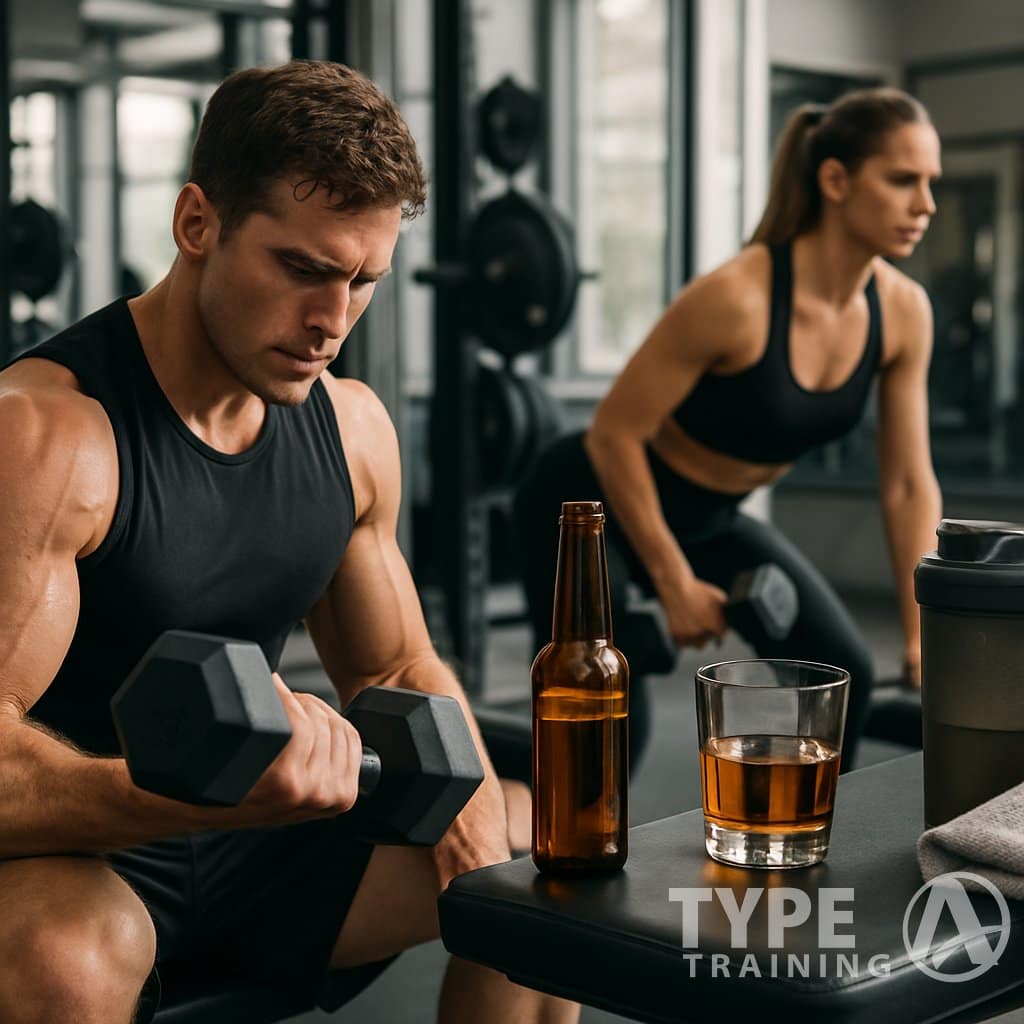
Alcohol makes it harder for your body to build and fix muscle tissue. These effects can slow down your progress and chip away at the results you’ve worked for in the gym.
Inhibited Protein Synthesis
Alcohol reduces protein synthesis rates, which is how your body builds new muscle tissue. Even moderate drinking can drop this process by up to 20%.
Your muscles rely on protein synthesis to get stronger after workouts. This is especially true in the 24-48 hours after strength training, when your body is busy repairing muscle tissue.
Even just one heavy night of drinking can disrupt protein synthesis for up to 24 hours. That’s a whole day of recovery down the drain.
If you want muscle growth, limiting alcohol is a must. Your body just can’t build muscle as efficiently while dealing with alcohol.
Slower Muscle Repair
Alcohol delays the muscle repair process that happens after exercise. When you work out, you create tiny tears in your muscle fibers that need to heal.
Alcohol gets in the way in a few ways:
- It increases inflammation in muscle tissue
- Disrupts the normal inflammatory response needed for repair
- Impairs nutrient delivery to your muscles
- Reduces growth hormone production during sleep
These effects are worse if you drink within a few hours after your workout. That’s when your muscles are most ready to repair.
The more often you drink, the worse these delays get. Regular alcohol consumption can lead to chronic problems with muscle repair.
Increased Recovery Time
After a tough workout, your body needs time to recover. Alcohol makes this recovery period longer, so you’ll need more time between training sessions.
Several things contribute to this:
- Dehydration – Alcohol acts as a diuretic, causing fluid loss and muscle cramps
- Sleep disruption – Poor sleep means worse recovery
- Hormonal imbalances – Lower testosterone, higher cortisol
Your normal recovery might take 24-48 hours, but with alcohol, that can stretch out to 72 hours or more for the same workout.
That means fewer productive training days each week. Over time, this slows your overall fitness progress.
Effects on Hydration and Nutrient Absorption
Alcohol messes with your body’s ability to stay hydrated and absorb nutrients. This can undercut your training efforts, even if you’re consistent with your workouts.
Diuretic Properties and Dehydration
Alcohol acts as a strong diuretic by blocking the production of antidiuretic hormone (ADH). This makes your kidneys process more fluid, so you end up running to the bathroom more often.
For every alcoholic drink, your body loses about 120ml of extra water. This hurts your fitness goals by leaving you dehydrated before your next workout even starts.
Dehydration of just 2-3% can drop exercise performance by up to 20%. That’s enough to make a hard workout feel impossible.
Your muscles are about 75% water, so hydration is essential for muscle function and recovery. When you’re dehydrated, you might notice fatigue, muscle cramps, and a higher risk of injury.
Compromised Nutrient Absorption
Alcohol blocks the absorption of key nutrients your body needs for fitness and recovery. Most of this happens in your digestive system.
Key nutrients affected include:
- Thiamin (B1): Needed for energy metabolism
- Vitamin B12: Important for red blood cell formation
- Folic acid: Crucial for cell repair and growth
- Zinc: Needed for muscle repair and immune health
Alcohol damages the cells lining your gut, so they can’t move nutrients into your bloodstream as easily. This impacts nutrient absorption and can create deficiencies, even if you eat well.
Your body’s glycogen stores, which fuel workouts, also take a hit when alcohol gets in the way of proper nutrition absorption.
Influence on Electrolyte Balance
Alcohol throws off your body’s electrolyte balance, which you need for muscle contractions, nerve signaling, and keeping fluids in check. This disruption can seriously mess with your athletic performance.
Because alcohol acts as a diuretic, you end up urinating more and losing key electrolytes like potassium, magnesium, and sodium. You need these minerals to avoid muscle cramps and to keep your energy up during exercise.
If your electrolytes are out of whack, you might notice muscle weakness, fatigue, or even an irregular heartbeat. Sometimes these effects linger for a day or two after drinking, which can mess with more than one workout.
Your body relies on just the right electrolyte balance for nerves and muscles to communicate. If this balance gets disrupted, your endurance drops and coordination suffers, making workouts less effective—and honestly, riskier.
Alterations in Metabolism and Weight Management
Alcohol really messes with your metabolism and can throw off your weight management goals. It’s not just about the calories in your drink—it changes how your body deals with nutrients and stores fat.
Slowed Metabolism
Your body always puts alcohol first. The liver drops everything else to break down ethanol, and that means it stops burning fat for a while. This shift in metabolism can make a big difference in your weight and overall health.
Some research suggests that drinking regularly can slow your metabolic rate by up to 73% for several hours. So, you burn fewer calories just sitting around than you usually would.
Alcohol also ruins your sleep, which drags your metabolism down even further. Even a few drinks can cut your sleep efficiency by 9-16%, messing with hormones that help your body use energy.
Increased Calorie Intake and Weight Gain
Alcoholic drinks are packed with calories but have pretty much no nutrients. For example, a shot of vodka has about 97 calories, a glass of wine averages 125, and a pint of beer can be anywhere from 150 to 300.
Alcohol makes you hungrier and lowers your inhibitions, which is a recipe for overeating. Studies say people eat about 384 extra calories on average when they drink with meals.
Your body can’t store alcohol calories, so it burns them off first. That means the food you eat is more likely to get stored as fat—especially around your belly. That’s one reason why the so-called “beer belly” sticks around, even if you work out.
Interference With Weight Loss Goals
Alcohol undercuts weight loss in a bunch of ways. It dehydrates you and can drop your exercise performance and recovery by almost 30%, according to some fitness studies.
It also slows muscle recovery and fat burning after you exercise. Protein synthesis gets sluggish, tissue repair takes longer, and your workouts just don’t pay off as much. If you’re trying to build muscle or lose fat, this is a real setback.
Hormones take a hit too. Alcohol can drop testosterone by up to 23% and ramp up cortisol, which is the last thing you want if you’re aiming for muscle growth or fat loss.
Disruption of Sleep and Mental Health
Alcohol really messes with your sleep cycles and mental health. These changes can slow your recovery and zap your motivation to work out.
Diminished Sleep Quality
It might feel like alcohol helps you fall asleep, but it actually cuts down on deep sleep and bumps you into lighter REM sleep. That means your body doesn’t recover properly after a workout.
If you drink before bed, you’ll probably notice:
- Waking up more during the night
- Less restorative sleep
- Feeling tired in the morning
- Slower muscle recovery
Your sleep can change depending on your genetics, age, and how used to alcohol you are. Drinking close to bedtime? That usually makes things worse.
Effects on Endorphins and Motivation
Alcohol gives you a quick endorphin boost, but then it crashes, leaving you less motivated. This up-and-down makes it tough to stick to a workout routine.
The morning after, you might deal with:
- Low energy
- Trouble focusing during workouts
- Less motivation
- Worse coordination and slower reflexes
All of this hurts your mental focus for training. When your brain’s not sharp, your form suffers—and that’s how injuries happen.
Mental Health and Wellness Implications
Alcohol works as a central nervous system depressant, changing your mood and how clearly you think. If you drink regularly, anxiety and depression can get worse, which then feeds back into your exercise habits.
The mental effects can include:
- More stress hormones
- Messier emotions
- Bad choices about fitness
- A growing reliance on alcohol for stress relief
Drinking over the long term just makes these problems add up. If you cut back on alcohol, especially before bed, you’ll probably sleep better and feel more resilient for your workouts.
Hormonal Changes and Physiological Stress
Drinking alcohol sets off a bunch of hormonal shifts that can really mess with your fitness progress. These changes hit both your recovery and performance.
Lowered Testosterone Levels
When you drink, your testosterone levels drop—sometimes by as much as 23% in men. That’s a big deal since testosterone is key for building muscle.
Even moderate drinking can throw off your hormones. You need testosterone for:
- Making muscle proteins
- Recovering after workouts
- Getting stronger
- Burning fat
If your testosterone tanks from alcohol, you’ll probably see slower gains in the gym—even if you’re putting in the work.
Elevated Cortisol and Inflammation
Alcohol raises your cortisol, the main stress hormone. This messes up your hormonal balance and creates a catabolic, muscle-breaking environment.
High cortisol means:
- More inflammation
- Slower recovery
- Muscle breakdown
- Weaker immune system
The inflammation from alcohol can last for days. That makes your muscles more likely to get hurt and slows down your bounce-back time.
Your body sees alcohol as a toxin, so it shifts into stress mode and focuses on getting rid of it. That means fewer nutrients go toward muscle repair and recovery—they’re all tied up with alcohol detox instead.
Alcohol And Women’s Health
Women face unique challenges when it comes to alcohol and fitness. Their bodies process alcohol differently than men’s bodies do.
Women generally have less water in their bodies than men. This means alcohol becomes more concentrated in the bloodstream.
When women drink, they experience higher blood alcohol levels even when consuming the same amount as men.
This happens because women typically have:
- Less body water to dilute alcohol
- Fewer enzymes to break down alcohol
- Higher body fat percentage (alcohol is stored in body fat)
Hormonal effects are significant too. Alcohol can disrupt women’s hormone balance, affecting:
- Menstrual cycles
- Fertility
- Bone health
The risk of breast cancer increases with alcohol consumption. Even one drink per day can raise this risk by 5-9%.
Heart health concerns are different for women. While moderate drinking might offer some cardiovascular benefits, excessive drinking damages heart function more severely in women.
Your fitness routine suffers specifically when you drink. Women experience more pronounced effects on:
- Muscle recovery
- Dehydration
- Exercise performance
- Motivation to work out
Healthy Approaches to Alcohol and Fitness
Finding balance between social drinking and fitness goals requires thoughtful strategies. You can make choices that minimize alcohol’s negative effects while still maintaining your exercise routine.
Practicing Moderation With Alcohol Intake
Moderation is key when balancing alcohol consumption with fitness goals. Limit yourself to 1-2 drinks on occasions when you do drink.
Avoid daily consumption. Women should aim for no more than 7 drinks per week, while men should stay under 14 drinks weekly.
Smart drinking strategies:
- Choose lower-alcohol options like light beer or wine spritzers
- Alternate alcoholic drinks with water to stay hydrated
- Eat a protein-rich meal before drinking to slow alcohol absorption
Planning your drinking around your workout schedule helps minimize impact. Consider avoiding alcohol 48 hours before important training sessions or competitions to maintain peak performance.
Remember that alcohol interferes with your body’s metabolism and can decrease performance, so timing matters.
Adopting A ‘Dry January’ or Similar Periods
Taking planned breaks from alcohol can significantly benefit your fitness routine. A “Dry January” or similar alcohol-free period gives your body time to recover and can jumpstart fitness progress.
Benefits of temporary sobriety:
- Improved sleep quality
- Enhanced workout recovery
- Better hydration levels
- Reduced overall calorie intake
- Clearer mental focus during exercise
Many people notice improvements in workout performance after just a few weeks without alcohol. That experience often motivates longer-term changes in drinking habits.
Track your fitness metrics during alcohol-free periods to see tangible evidence of improvement. This data can help you make informed decisions about your relationship with alcohol going forward.
Tips for Avoiding Alcohol After Workouts
Post-workout drinking is particularly problematic as alcohol disrupts muscle recovery. Your body needs proper nutrition after exercise, not the empty calories and dehydrating effects of alcohol.
Post-workout alternatives:
- Chocolate milk (provides protein and carbs)
- Smoothies with protein powder
- Coconut water for electrolytes
- Herbal teas for relaxation
If you’re in social situations where drinking is expected, have a prepared response ready. Something simple like “I’m focusing on recovery tonight” works well.
Plan post-workout meals in advance so you’re less tempted by convenient but less healthy options.
About 90-98% of alcohol is metabolized by your liver, and exercise won’t speed this process.
Non-Alcoholic Beverage Brands for Refreshing Alternatives
Trying to stick to your fitness goals but still want something tasty to sip on? You definitely don’t have to settle for plain water or overly sweet juices.
The non-alcoholic beverage scene has really taken off lately. In fact, the non-alcoholic drinks market surpassed $11 billion worldwide in 2022, which is kind of wild if you think about it.
Here are a few standout brands you might want to check out:
Seedlip was one of the first to offer premium non-alcoholic spirits, and they’ve got three main flavors:
- Garden 108: Herbal, fresh, and honestly perfect for summer drinks
- Spice 94: Warm notes of cardamom and citrus
- Grove 42: Bright, citrusy, and great for zesty mocktails
If you’re after something with a coastal vibe, Pentire Adrift brings botanical flavors like rosemary and sage. It pairs well with tonic water, especially after a workout when you want something more grown-up.
Monday Gin gives you that classic gin experience with juniper and citrus. Mix up a G&T that won’t mess with your early morning run or gym plans.
Wine fans, you’re not left out. Fre Wines has alcohol-free options with the complexity of real wine, just minus the alcohol and with fewer calories. Their Chardonnay and sparkling bottles are kind of perfect for a post-workout toast.
Curious Elixirs does things a bit differently, adding adaptogens like ashwagandha to their ready-to-drink cocktails. It’s a clever way to help manage stress from tough workouts, plus the flavors are pretty unique.
Lyre’s offers a huge lineup, so you can recreate nearly any cocktail you want—just without the alcohol. Their award-winning spirits make it easy to join in at parties without feeling left out or derailing your fitness routine.
Frequently Asked Questions
How long after drinking alcohol does it affect your workout performance?
Alcohol can affect your workout performance for up to 72 hours after consumption. Immediate effects include reduced coordination, slower reaction times, and impaired decision-making that can last 24-48 hours.
Even if you feel fine, your body is still processing the alcohol, which interferes with muscle protein synthesis, hydration levels, and recovery processes. For optimal performance, avoid drinking alcohol at least 48 hours before important training sessions or competitions.
Does drinking alcohol after a workout ruin your gains?
Yes, drinking alcohol after a workout can significantly impair your muscle gains. Alcohol reduces muscle protein synthesis by up to 20%, which is the process your body uses to repair and build muscle tissue.
Post-workout is when your muscles are most receptive to nutrients and recovery, and alcohol diverts your body’s resources away from muscle repair toward metabolizing the alcohol. Additionally, alcohol increases inflammation, disrupts hormone balance, and impairs nutrient absorption—all of which slow down recovery and diminish the benefits of your workout.
How much does alcohol slow down muscle recovery?
Alcohol can extend your normal muscle recovery time significantly. What typically takes 24-48 hours to recover from can stretch to 72 hours or more when alcohol is involved.
This happens because alcohol reduces growth hormone production, increases cortisol levels, disrupts sleep quality, causes dehydration, and impairs the delivery of nutrients to muscles. The severity depends on how much you drink and when—drinking heavily right after a workout causes the most damage to recovery processes.
Can you drink alcohol and still build muscle?
You can still build muscle while occasionally drinking alcohol, but it will slow your progress. The key is moderation and strategic timing. Limit yourself to 1-2 drinks on occasions when you do drink, and avoid alcohol within 48 hours of important workouts.
Women should aim for no more than 7 drinks per week, while men should stay under 14. Avoid drinking immediately after workouts when your muscles are primed for recovery. If you practice strict moderation and time your drinking away from training sessions, you can minimize alcohol’s negative impact on muscle growth, though abstaining completely will always yield better results.
Why does alcohol make you gain weight even if you exercise?
Alcohol contributes to weight gain even with regular exercise for several reasons. First, alcoholic drinks contain empty calories (97-300 calories per drink) with no nutritional value. Second, your body prioritizes metabolizing alcohol over burning fat, effectively pausing fat burning for several hours.
Third, alcohol increases appetite and lowers inhibitions, leading people to consume an average of 384 extra calories when drinking with meals. Fourth, it slows your metabolic rate by up to 73%, meaning you burn fewer calories at rest. Finally, the calories from food eaten while drinking are more likely to be stored as fat, particularly around the midsection, because your body is busy processing the alcohol first.
What happens if you work out hungover?
Working out while hungover is generally a bad idea and can be dangerous. You’ll experience decreased coordination, slower reaction times, impaired judgment, and reduced strength and endurance.
Your body is dehydrated and depleted of essential electrolytes, which increases your risk of injury, muscle cramps, and cardiovascular strain. Cognitively, you’ll have trouble focusing, which can lead to poor form and accidents. Your motivation and energy levels will be low, making the workout feel much harder than it should. If you do choose to exercise while hungover, stick to light activities like walking or gentle stretching, drink plenty of water, and avoid heavy weights or high-intensity training.
How does alcohol affect women’s fitness differently than men’s?
Women experience more pronounced effects from alcohol on fitness for several physiological reasons. Women generally have less body water than men, which means alcohol becomes more concentrated in their bloodstream even when consuming the same amount. They also have fewer alcohol-metabolizing enzymes, so alcohol stays in their system longer.
Women experience greater hormonal disruptions from alcohol, affecting menstrual cycles, fertility, and bone health. The risk of breast cancer increases by 5-9% with just one drink per day. Women also experience more severe effects on heart function, muscle recovery, dehydration, and exercise performance compared to men. These differences mean women need to be even more cautious about alcohol consumption when pursuing fitness goals.

